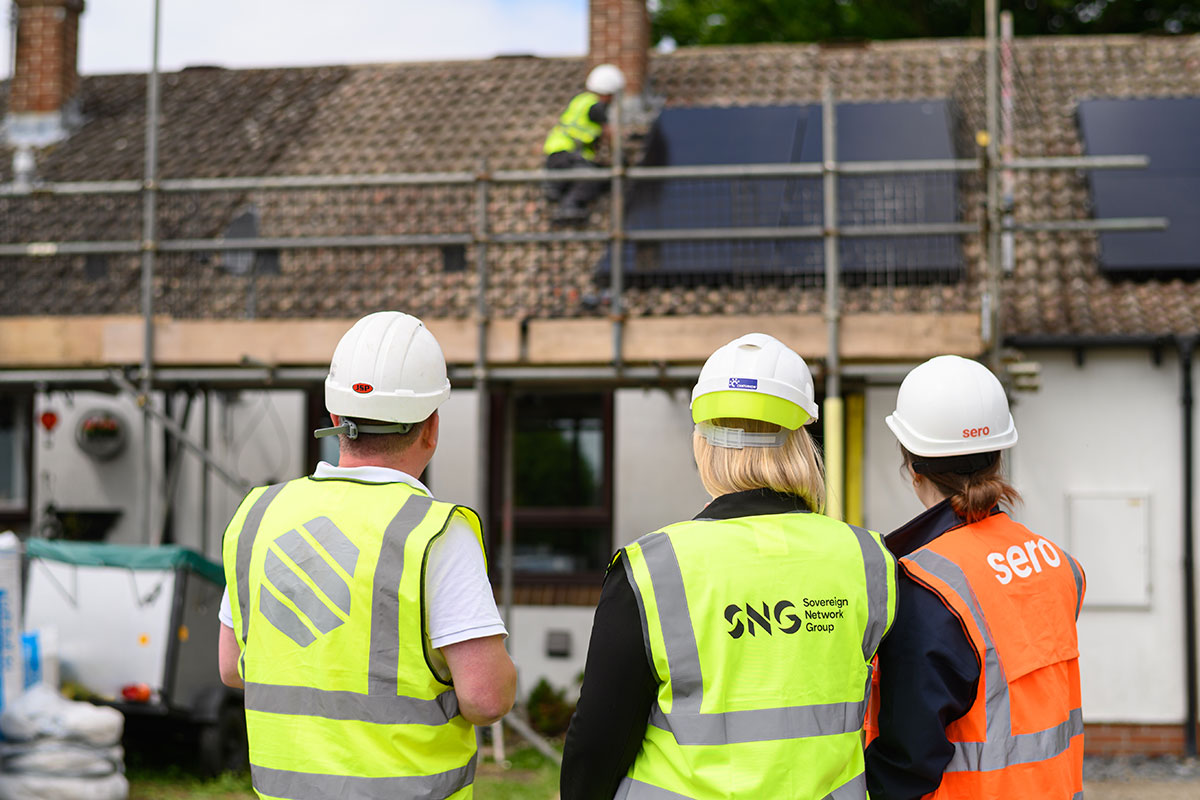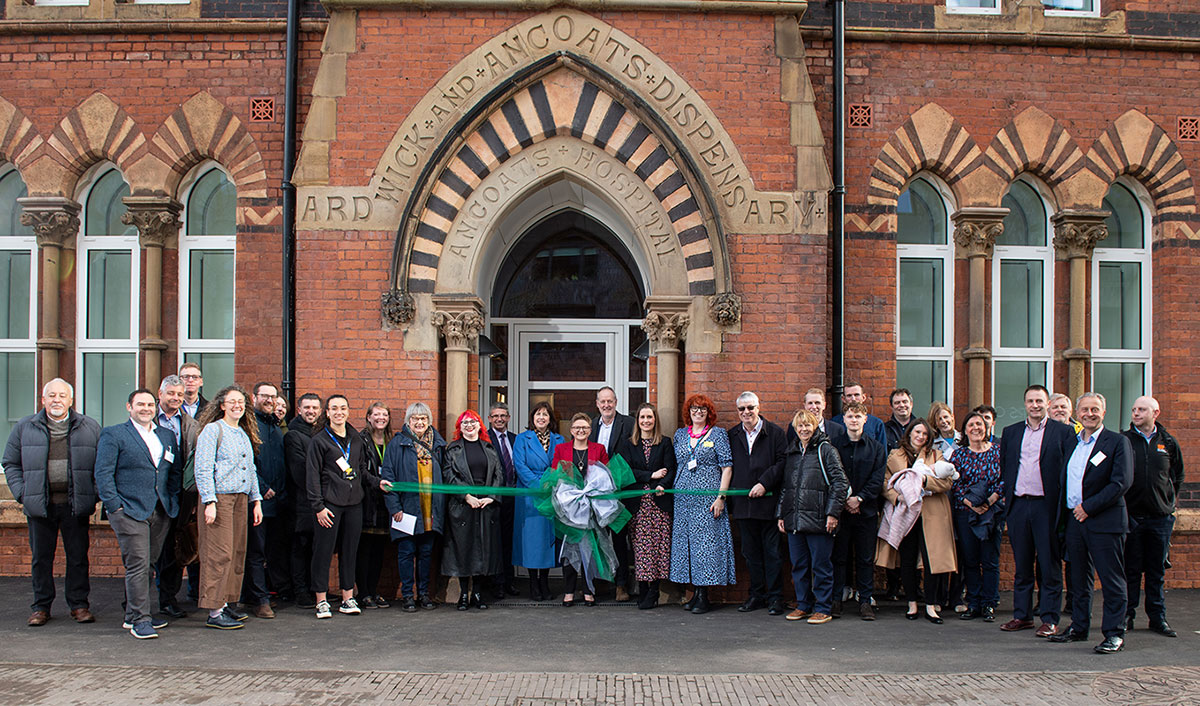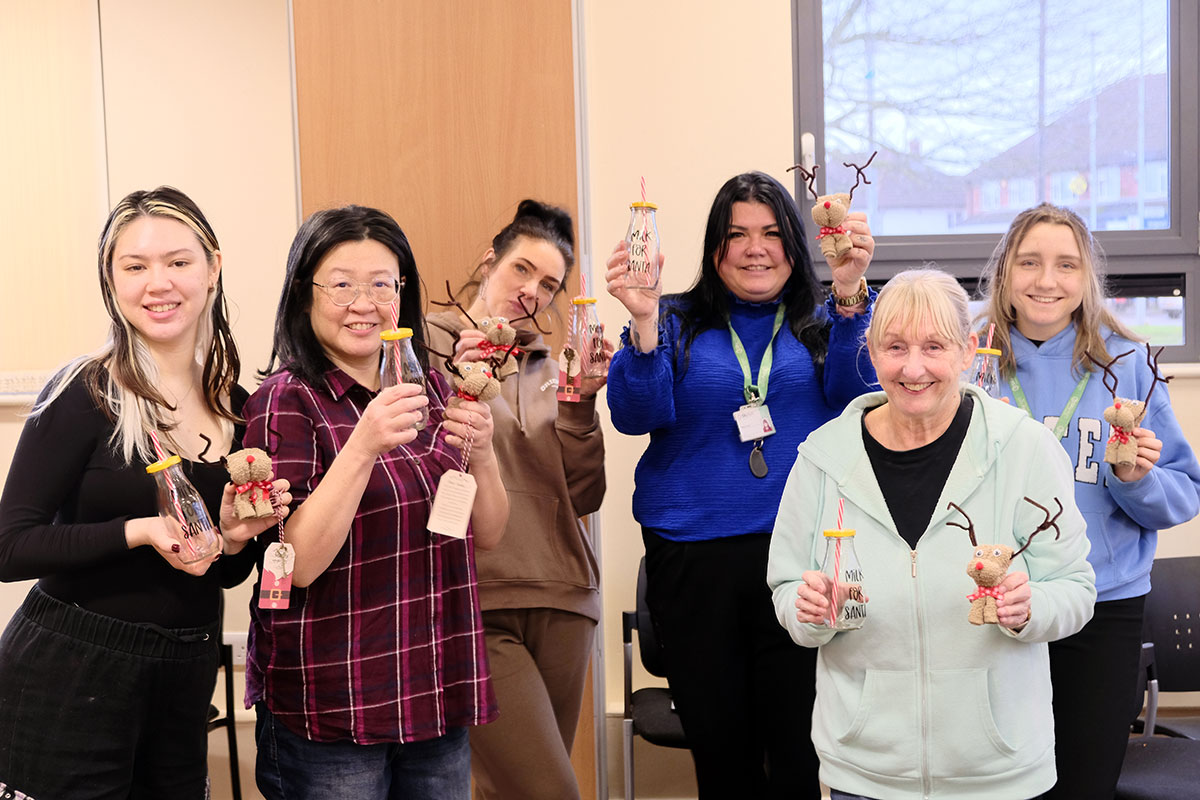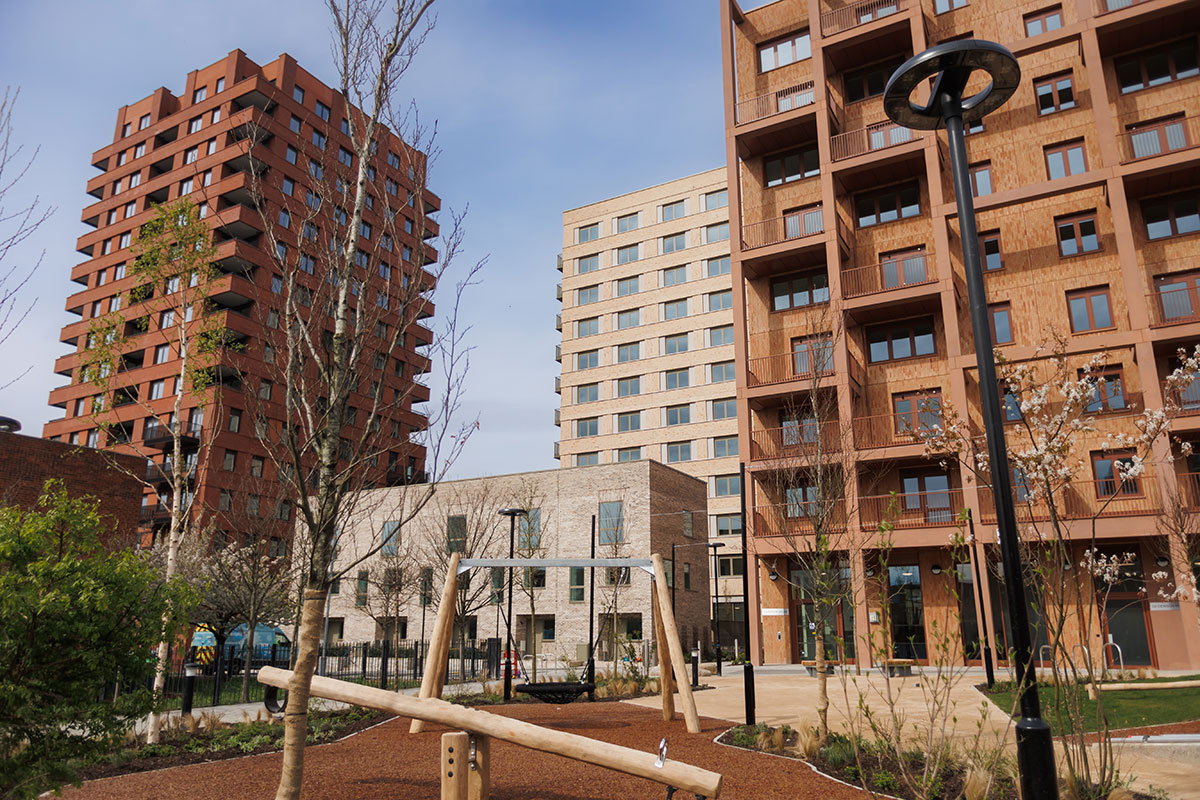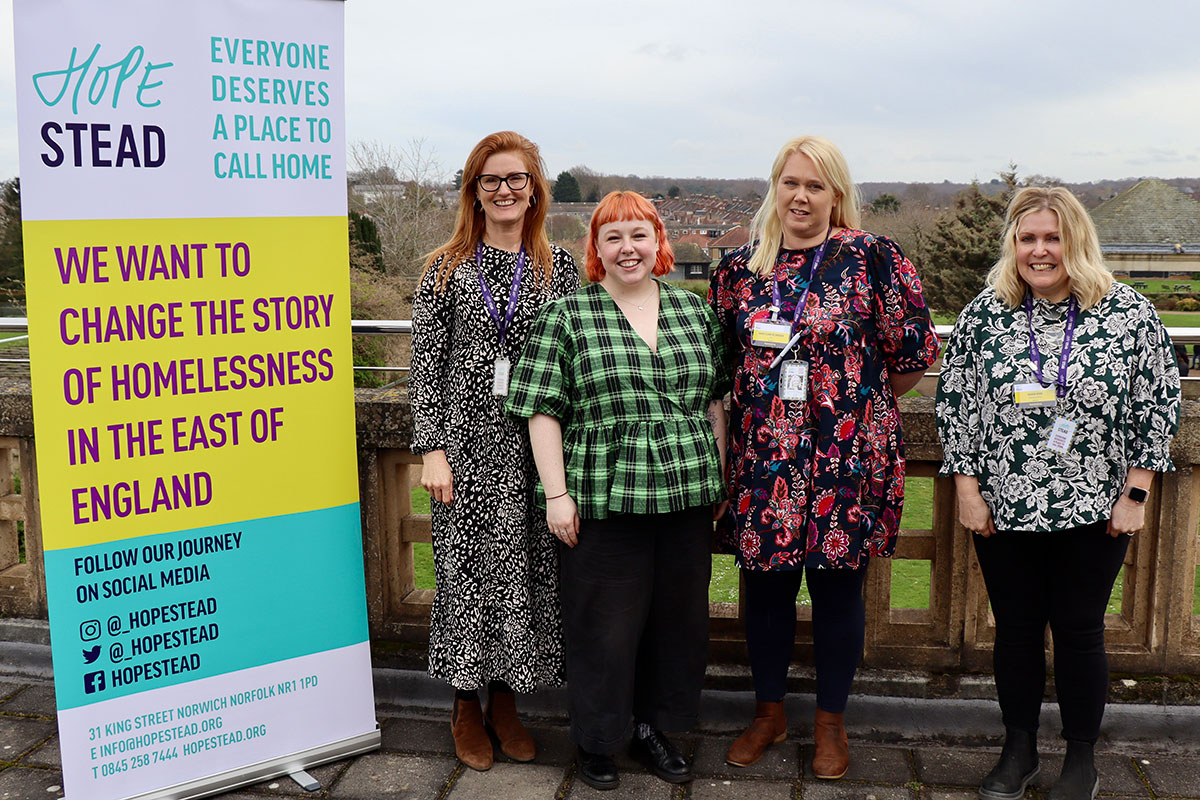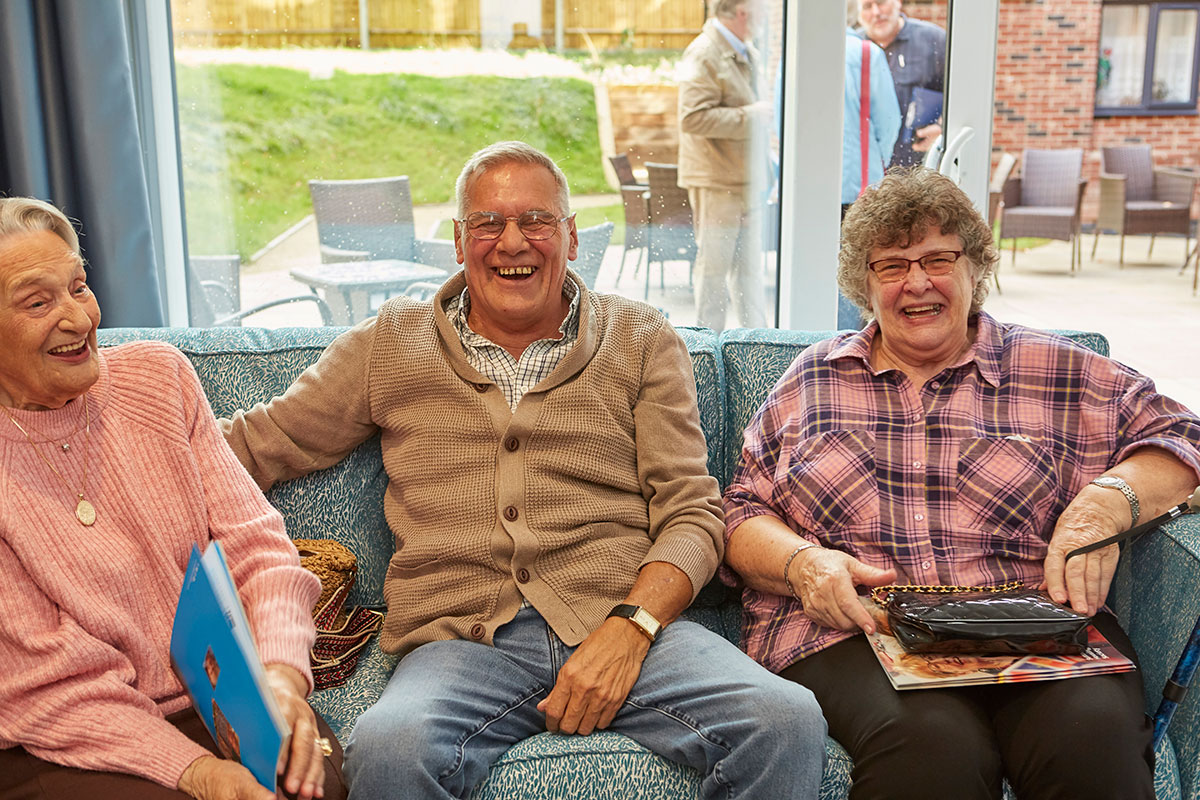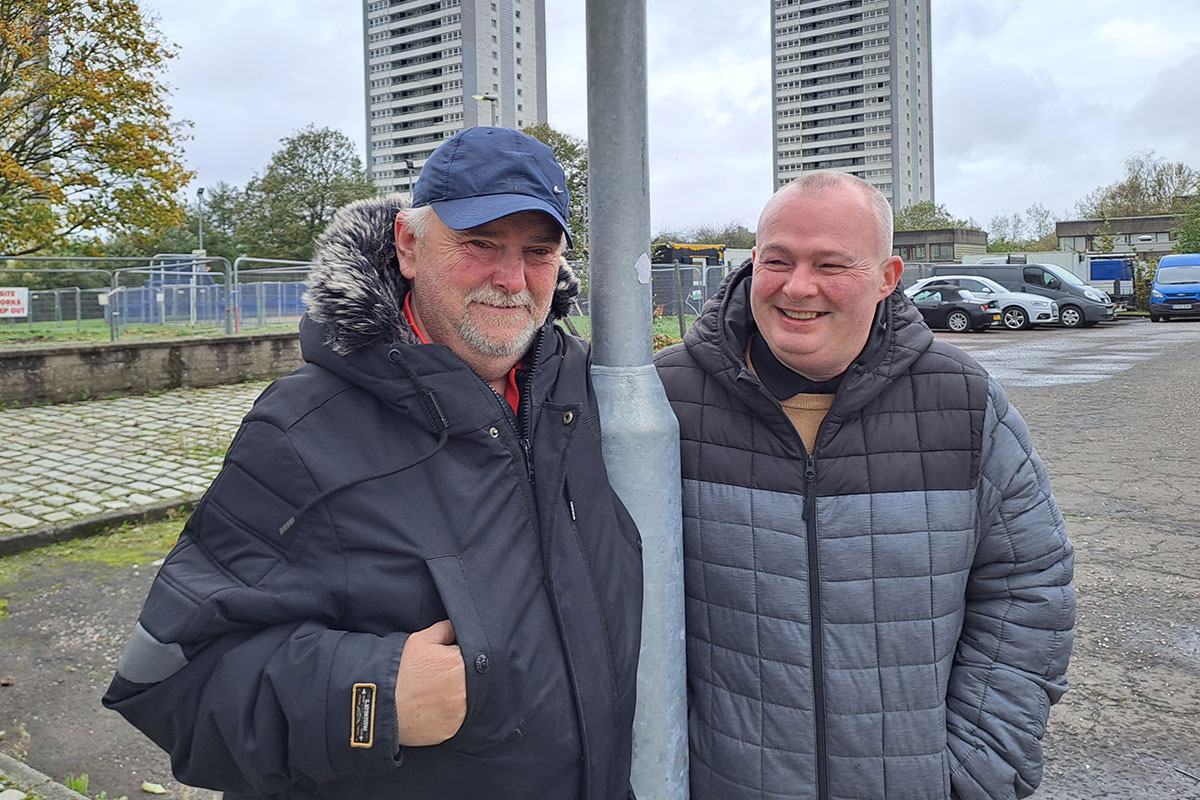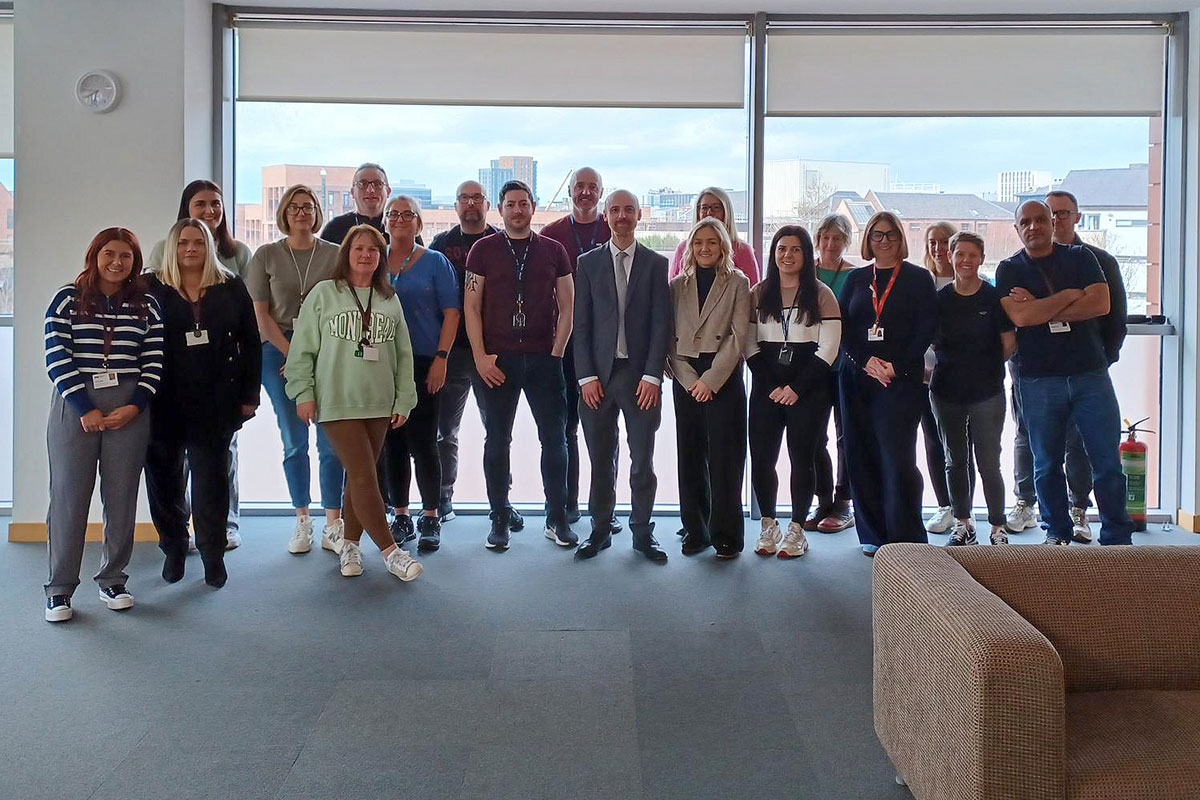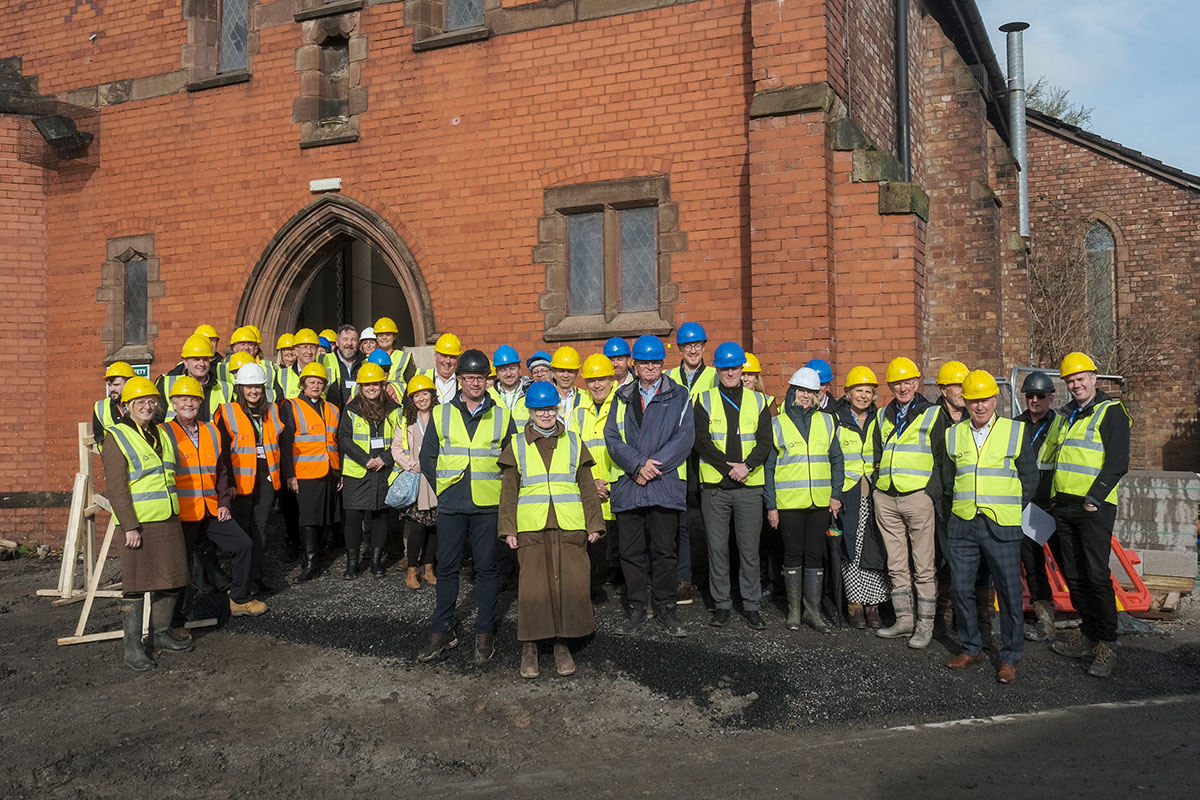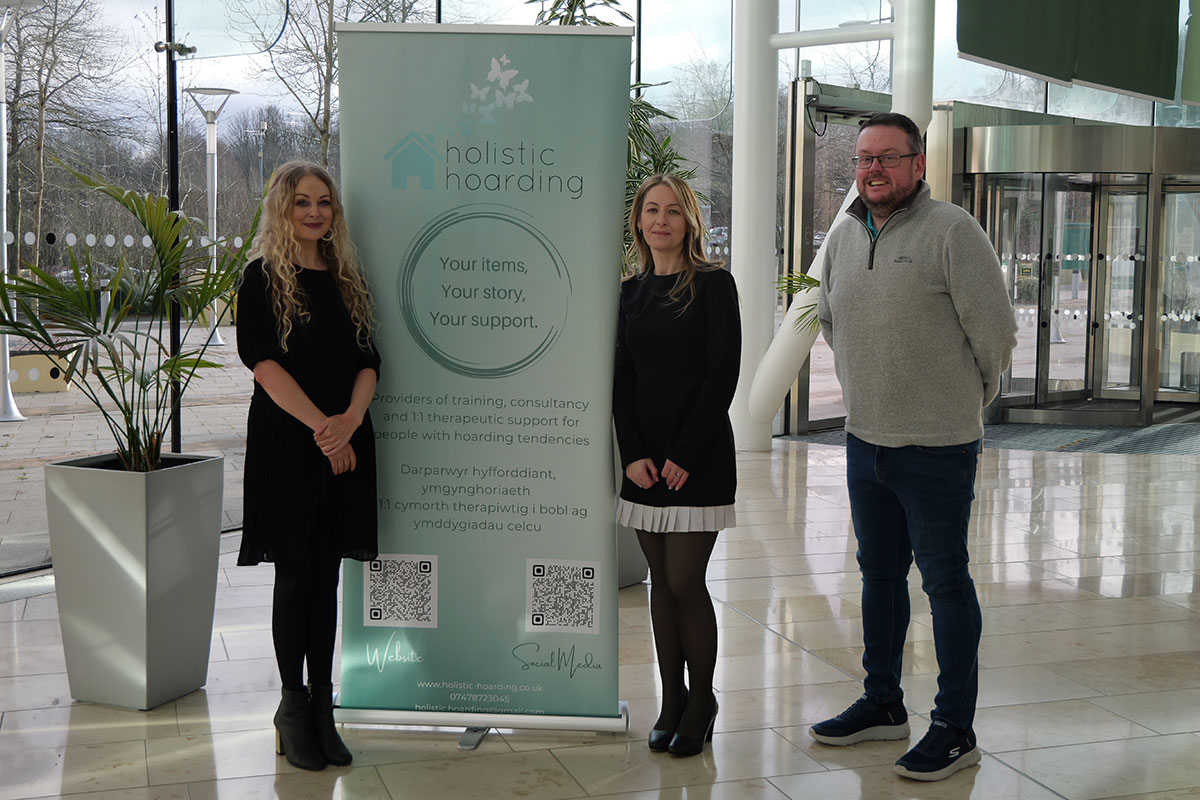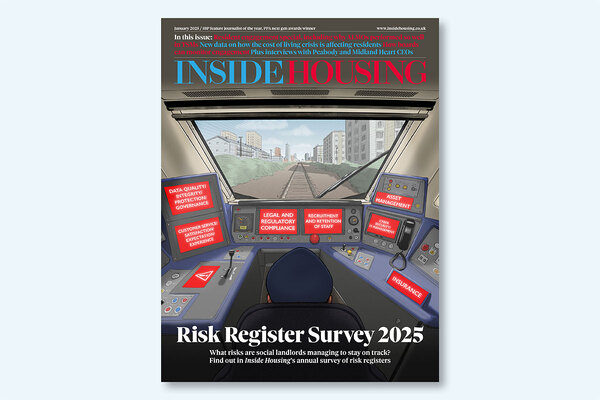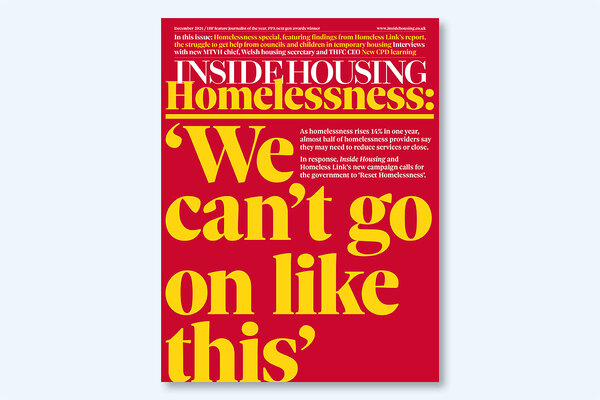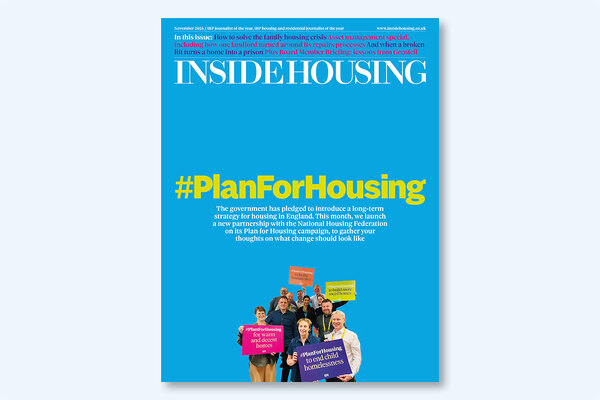You are viewing 1 of your 1 free articles
UK Housing Awards 2024: the winners
Inside Housing reveals the winners of this year’s UK Housing Awards
The UK Housing Awards showcases success and new ideas, and spreads learning across the social housing sector. The awards, now in their 27th year, are about identifying the social landlords, charities and partners who work with their communities to deliver great outcomes for residents.
Judged by experts from individual fields, they are designed not just to celebrate success, but to help other landlords learn from it and replicate it, helping to improve services across the sector.
Every year, the awards are judged by an esteemed panel of industry experts. We pride ourselves on the robustness of our judging process, ensuring all entries are fairly considered and thoroughly reviewed.
Our industry experts review our entries to ultimately decide on the shortlist and winners in a two-step judging process, with the finalists presenting to the judges in round two.
A note from Jess McCabe, deputy editor, Inside Housing
In the following pages, you can read about some of the best work being done in the social housing sector.
For the 27th year in a row, the UK Housing Awards are putting the spotlight on organisations and teams delivering exceptional services for residents and communities. The categories showcase what the sector can achieve, and the many forms that takes – from use of data and delivering supported housing, to partnership working approaches to building homes.
The need is clearer than ever. When editor Martin Hilditch wrote an introduction to last year’s awards, he talked about new figures showing nearly 140,000 children were living in temporary accommodation. Shockingly, this has risen another 15% in just one year; now almost 160,000 children live in temporary accommodation.
The start of new consumer regulations in England this year had some crucial lessons on what is going wrong. But all this makes it even more important to talk about what is working well and delivering really good outcomes for tenants.
Let’s not forget the crucial role the sector already plays in communities across the UK. The focus of these awards is on social landlords, charities and partners – it’s about celebrating success. And it’s about helping other landlords learn from it and replicate it, to improve services across the sector.
Thanks to our sponsors and judges for their support in making the awards such a success this year. And congratulations to our winners. Here are their stories.
Jess McCabe, deputy editor, Inside Housing
Professional services partner of the year
Sero
- Sero’s approach to retrofitting unlocks external finance while cutting residents’ energy costs It installs solar panels, batteries and energy metering in homes, and bills residents directly
- The savings produced ensure a steady revenue stream for funders and lower bills for households
- It is estimated that the social housing sector will need £104bn to meet its net zero targets, but only around 25% of this will be met via grant funding. Finance is therefore a major barrier to delivery, which is where Sero’s unique approach comes in.
The energy services company accelerates and unlocks large-scale retrofit projects by sharing the savings created by domestic renewable electricity generation.
Sero installs solar panels, battery storage and its own energy metering system as part of retrofit projects.
The company then bills residents for the electricity they consume from both the grid and the renewable technology installed in their homes. The tariff charged for renewable energy consumption combined with income generated from electricity sold back to the grid allows the finance to be paid back directly to the funder – or to the landlord, should they wish to self-fund.
This tariff is charged at a cheaper rate than that charged by the grid, ensuring residents receive a significant saving on their electricity bills and can afford to heat their homes.
The judges said:
“This company fills an important gap in the market. We were impressed by their commitment to decarbonisation and the end-to-end service they offer housing providers”
This category was judged by:
Peter Apps, contributing editor, Inside Housing
Martin Collett, chief executive, English Rural
Highly commended
Mobysoft
Home builder of the year
Great Places Housing Group
- Great Places built more than 530 homes last year across a range of types, tenures and locations
- Projects include its first low-carbon scheme and conversion of the Grade II-listed Ancoats Dispensary
- It launched a £1.5bn framework to deliver new homes and associated social infrastructure in the North
Great Places prides itself on its innovative approach to development, which delivered more than 530 homes last year. These include family housing, mid-rise flats, heritage restoration and community-focused projects, in urban, suburban and semi-rural locations, and cover every tenure from shared ownership to social rent.
Community is at the heart of decision-making. Its digital platform, Our Voice, makes it easier for residents to share views on proposed developments and be part of consultations.
Some of 26,000-home Great Places’ most ambitious projects to date also came to fruition, including converting the Grade II-listed Ancoats Dispensary in Manchester into 39 flats for affordable rent; a 106-home fully mixed-tenure development in Harwood Road, Stockport; and its first low-carbon site at Downley Drive, Manchester.
It also recently launched a £1.5bn Innovation Chain North construction framework to support the delivery of new homes and associated social infrastructure across the North of England; 23 clients are already benefiting from more cost-effective procurement as a result.
The judges said:
“This is a home builder with a vision that showed how seriously it took the long-term stewardship of communities it was working in, and stretched resources to maximise impact”
This category was judged by:
Jennifer Donald, assistant director, government relations and assurance, Homes England
Martin Hilditch, editor, Inside Housing
Syreeta Robinson-Gayle, head of affordable housing, Barratt London
Highly commended
Choice Housing Ireland
Sponsored by:

Campaign of the year
Listen Up, Choice Housing Ireland
- This campaign seeks to address the high rate of youth suicide in Northern Ireland
- The campaign’s cornerstone is a student-led video that has found a wide audience
- It has become a vital educational resource and is now embedded in the Northern Ireland curriculum
Northern Ireland has the highest youth suicide rate in the UK, and the Listen Up campaign seeks to address this critical issue.
The campaign was devised by 11,000-home landlord Choice Housing, working with two partners: 450-home Ark Housing and All Lives Are Precious, a leading organisation in suicide prevention.
The cornerstone of the campaign was the creation of the Listen Up video. This was the culmination of eight weeks’ work by students from four high schools. The video was launched on World Mental Health Day in October last year, and quickly gained traction online. However, its impact extended beyond social media; the video has become a vital educational resource, and has been incorporated into the Northern Ireland Education Authority’s curriculum. The Listen Up campaign also included comprehensive suicide prevention training for teachers in the four participating schools.
Listen Up is used as a resource by parents, young people and the community, who can access this tool to understand the risk of suicide and learn how to talk about this serious issue.
The judges said:
“What most struck us was this campaign’s impact: it is now shown in more than 1,000 schools in Northern Ireland as part of the curriculum, reaching 350,000 pupils a year”
This category was judged by:
Jamie Ratcliff, chief communities and sustainability officer, Sovereign Network Group
Katharine Swindells, deputy features editor, Inside Housing
Highly commended
Westminster City Council
Innovator of the year – housing association/local authority
Universal Credit team, Thirteen
- Thirteen developed a bot that can verify rent increases for Universal Credit claimants to the DWP
- The bot successfully reported 100% of increases, cutting costs and leading to industry adoption
- The DWP ran a successful pilot in 2023, and officially approved the use of bots earlier this year
In February 2022, the Department for Work and Pensions (DWP) announced it would be asking landlords to verify rent increases for customers on Universal Credit through its Universal Credit Landlord Portal.
When 34,000-home Thirteen Group analysed the impact on its business, it found it would take 48 colleagues working full time over April to carry out this process manually, at a cost of more than £70,000 in overtime.
So the landlord developed a bot to undertake the task instead. The project was a success: 100% of rent increases were successfully reported to the DWP.
Thirteen then went on to work with other social landlords to roll this innovation out across the sector, and successfully persuaded the DWP to begin a pilot. This launched in March 2023, with a number of housing organisations testing different types of bots alongside the DWP.
The pilot was a success. In March this year, the DWP officially approved the use of bots for verifying annual rent increases, as well as for new claims and changes to claims.
The judges said:
“A solution to a pressing problem that reflects creative thinking, demonstrates tangible, measurable and significant positive outcomes, and is replicable across the sector”
This category was judged by:
John Doyle, founder and non-executive director, Voicescape
Michael McDonnell, group chief executive, Choice Housing
Highly commended
North Tyneside Council and Husk
Innovator of the year – independent
Kensa Heat Pumps
- Kensa pioneered a ground source heat pump that can be used to heat blocks of flats, or connect streets
- It is being used in tower blocks by landlords including Gentoo, Thurrock and Enfield councils
- The technology can reduce residents’ heating bills by 30-50%
In 2012, Kensa built the world’s smallest and quietest ground source heat pump. The Shoebox is small enough to fit inside any property, and can be installed in flats and high-rise blocks. Kensa says the updated version, Shoebox NX, can be used without energy efficiency improvements.
Instead of putting a large air source heat pump in each home, each device is connected to a shared ground source loop array. This allows whole tower blocks, or a whole street of terraced houses, to be connected. It can be linked up in networks that function as district heating systems. This approach not only eliminates the heat loss common in traditional heat pump systems, but ensures each home has freedom over its energy usage and billing. The technology can reduce residents’ heating bills by 30-50%, especially when it replaces inefficient night storage heaters. It helps to tackle fuel poverty, reduce winter deaths, and promote tenants’ health and well-being.
The Shoebox uses non-flammable refrigerants, offering a safe alternative to the gas boilers traditionally used in high-rise blocks. It also saves landlords money; Kensa’s products do not require annual servicing and have a lifespan of 20 years.
The judges said:
“One of the biggest challenges for the sector is the transition to zero carbon. Kensa’s networked ground source heat pumps represent a real innovation in this field”
This category was judged by:
Jess McCabe, deputy editor, Inside Housing
Steve Winterbottom, project manager, John Southworth
Highly commended
Chute Fire Certification
Resident employment and training award
Employment and training team, SKylight
- SKylight’s employment team delivers a tenancy-blind service in Stockport’s most deprived areas
- They provide face-to-face advice, work placements, training and volunteering opportunities
- In 2023-24, the SKylight team supported 208 people into employment
SKylight is a charitable community benefit society and part of Stockport Homes Group. Over the past year, SKylight brought together several of its services. Combining employment, training, housing support and social inclusion has resulted in customers transitioning seamlessly between essential support pathways, lowering their barriers to employment, training and education.
Most of SKylight’s work is with people living in Stockport’s most deprived areas. To combat the entrenched poverty these communities face, the team delivers a multifaceted tenancy-blind service that supports all local residents. This includes face-to-face employment information, a weekly job club, and a weekly interactive job booklet filled with live links to local vacancies, employment events and training.
Between April 2023 and March 2024, the booklet was viewed 3,758 times and generated 313 employment support referrals as a direct result.
To support service users, the team provides access to work placements, volunteering opportunities and training. In 2023-24, it supported 208 people into employment.
The judges said:
“It is great to see an organisation that was prepared to grasp the nettle and do things differently, while putting their customers at the heart of what they do”
This category was judged by:
Kai Jackson, Tpas associate and involved tenant
Ann Leslie, chief executive, Lar Housing Trust
Highly commended
Gravesham Borough Council
The neighbourhood transformation award
Gascoigne West Phase 2, Wates and Barking and Dagenham Council
- Phase 2 of this regeneration has delivered 386 new homes and £874m in local investment
- Community engagement has been fundamental to this project in London from the outset
- This project has set a new standard for urban development from which others can learn
Built in the 1960s, the Gascoigne Estate in Barking, London, was characteristic of the decline many other urban housing estates of its time had suffered since being built, featuring a number of deteriorating high-rise towers and a lack of useful amenities.
Phase 2 of the regeneration of the western part of the estate was completed in March.
A successful partnership between developer Wates and Be First, the regeneration arm of Barking and Dagenham Council, has delivered 386 new homes in this phase – 60 for social rent, 46 for London Affordable Rent, 122 for affordable rent and 158 at market rent – and £874m of investment into the local area.
Community engagement has been a priority throughout, and has enabled the integration of residents’ preferences, such as finding the right balance between housing density and green space.
The project also incorporates cutting-edge sustainable design principles to minimise its environmental impact and, ultimately, enhance resident comfort. By integrating these principles of sustainability and community engagement, the project has set a new standard for urban development from which others can learn.
The judges said:
“This is large-scale, big-impact stuff. From start to finish, the approach was well thought through, with impressive community engagement early in the process”
This category was judged by:
Paul Fiddaman, group chief executive, Karbon Homes
Martin Hilditch, editor, Inside Housing
Highly commended
Mellishaw Park, Lancaster City Council
Sponsored by:
![]()
Homelessness project of the year
Hope at Home initiative, Hopestead, Flagship Group
- Hope at Home supports people moving out of homelessness to turn their house into a home
- This includes providing new furniture and appliances, chosen by the tenant, as well as flooring
- In the previous financial year, this project supported 418 people in 239 households
Hope at Home is an initiative that provides people and families in the East of England moving out of homelessness into a property with everything they need to turn their house into a home. It is run by Hopestead,
the charity set up by 33,000-home landlord Flagship in 2020. Assistance offered includes new furniture and appliances, as well as cutlery and crockery. New flooring is also included to make the house feel warmer
and more homely.
Crucially, Hope at Home is centred around an offer of dignity and choice. The people it helps can choose the colours, style and finish of their items, so they can create a home that reflects who they are.
The average person Hope at Home helps is a mother in her late 20s or early 30s, usually fleeing domestic violence or abuse from an ex-partner.
Others are living with a serious illness such as cancer, and because of this have lost their job and cannot pay their rent.
Over the previous financial year, Hope at Home supported 418 people (264 adults and 154 children) in 239 households.
The judges said:
“Hope at Home is a model for other large housing associations – a humane and valuable way to keep people in their homes. It deserves to gain traction”
This category was judged by:
James Riding, chief reporter, Inside Housing
Kim Sutton, services manager, Bromley Homeless Charity
Highly commended
Single Homeless Project
Best older people’s landlord
Sutton Housing Society
- Sutton Housing Society’s team of 18 serves 502 homes, 80% of which are for older residents
- Sutton has achieved a 95% tenant satisfaction score and is a Sunday Times Best Places to Work 2024
- Community engagement programmes support residents’ well-being as they age
For 502-home Sutton Housing Society, small is beautiful. Four-fifths of its homes are specifically for residents aged 55 and over. Sutton’s equal emphasis on both its customers and its team of 18 staff to provide excellent quality of services is demonstrated in its overall tenant satisfaction score of 95%, and by its inclusion in The Sunday Times list of Best Places to Work 2024.
As members of a very small team, Sutton’s staff wear many hats – and this drives its high performance. Colleagues work alongside residents on several projects – such as Sutton’s residents’ charter and the tendering and awarding of service contracts – and keep them involved throughout.
Sutton also delivers an ambitious community engagement programme, packed full of events that support and encourage residents’ well-being as they age, helping to ensure they enjoy living where they do.
All residents are also enabled to contribute to their communities in a variety of ways. Last year, Sutton directly provided 347 opportunities for residents to take part. This represented an increase of nearly 17% on the previous year.
The judges said:
“Although small in scale, the impact and ambition of this organisation are outstanding. It is their great staff and customer engagement that elevates them among their peers”
This category was judged by:
Lucy Cheetham, development manager, South Lakes Housing
Jehan Weerasinghe, managing director, One Housing (Riverside)
Highly commended
United St Saviour’s Charity
Best supported housing landlord
L&Q Living
- L&Q Living provides housing and support to more than 3,000 residents
- Services include a free handyperson service and 24-hour supported accommodation
- Its inclusion initiative delivers free activities for residents, reducing loneliness and improving well-being
L&Q Living (LQL) provides specialist housing with care and support across London, the South East and the North West to more than 3,000 residents, including people experiencing homelessness, mental health issues and with learning disabilities. However, it offers far more than just bricks and mortar.
LQL’s services include everything from 24-hour supported living accommodation for individuals with complex needs, to short-term floating support.
Residents benefit from an emergency response to all crucial repairs, a free handyperson service and an annual home MOT to identify problems requiring attention.
Its inclusion initiative awards more than £30,000 in grants each year to organisations offering free activities to residents. It aims to reduce loneliness and isolation, while easing the pressure on statutory services such as GPs.
The scheme is a resounding success: 89% of residents told LQL it had reduced feelings of loneliness and isolation, 20% said they had made fewer visits to a GP, and 71% reported an improvement in their health and well-being.
The judges said:
“L&Q’s supported living service has a breadth and scope that is remarkable. There is no doubt that its services are saving lives in increasingly challenging circumstances”
This category was judged by:
Vikki McCall, professor of social policy, University of Stirling
Jitinder Takhar, board member, Leadership 2025
Highly commended
Transform Housing and Support
Recruitment or retention campaign of the year
Housewarming, Settle
- The Housewarming programme immerses new Settle hires in the sector and its culture and values
- The week-long induction includes activities such as social housing history and property visits
- New colleagues report higher job satisfaction, and there has been a 20% reduction in onboarding time
Recognising the critical role a well-trained and motivated team plays in delivering high-quality services, Settle launched its Housewarming programme in July last year.
It is an innovative week-long induction for new staff members that immerses them in the social housing sector, and in the 10,000-home landlord’s operations, culture and values. The programme includes sessions on the history, challenges and future of social housing, as well as activities such as visiting an empty property and shadowing Settle’s customer hub. The aim is to ensure new colleagues understand the importance of their roles in the context of social housing, and to promote a collaborative, inclusive and supportive working environment.
The impact has been immediate and significant. New colleagues report a deeper connection to Settle’s mission and values, and cite higher levels of job satisfaction and engagement.
Housewarming has helped new hires to hit the ground running. They have demonstrated quicker adaptation to their roles and responsibilities, reducing the typical onboarding time by 20%.
The judges said:
“This is an innovative project with tangible results. There is buy-in across the organisation, including from the executive team, who is also involved in the delivery of the initiative”
This category was judged by:
Helen Johnson, Livin Futures manager, Livin Housing
Ben Laryea, chief executive, Ekaya Housing Association
Excellence in community-led decision-making
Wheatley Group
- Wheatley’s £100m regeneration in Glasgow will deliver 400 affordable homes and a community hub
- Tenant input, led by the Wyndford Future Focus Group, has shaped the project’s plans from the outset
- Group members’ knowledge of the area and its heritage has been key to the project
Giving tenants a voice is key to 95,900-home Wheatley Group’s ethos. This is exemplified by Wheatley Homes Glasgow, which has been working with local tenants for the past 18 months to transform the Wyndford neighbourhood in the city’s Maryhill area.
A £100m regeneration project will deliver nearly 400 new affordable homes (85% for social rent and 15% for intermediate rent) and a purpose-built community hub.
Wyndford’s residents have been at the heart of the plans since the project began. Members of the tenant-led Wyndford Future Focus Group (WFFG) have shown commitment from the start, working alongside Wheatley to help shape the masterplan for the area.
These tenants have a wealth of knowledge about the area, including its heritage as a former army barracks. As Chris Quinn (pictured above, right), a Wheatley Homes Glasgow tenant and one of the co-chairs of WFFG, puts it: “These are hugely exciting times for Wyndford. This £100m regeneration will shape our community for the better, not only for the people who live here today, but for families and generations to come.”
The judges said:
“Working with leaders from within their communities, they made sure the approach taken was in keeping with the history of the area, but was also built for the future”
This category was judged by:
Martin Hilditch, editor, Inside Housing
Afshan Iqbal, project manager, pathway to board, Cardiff Community Housing Association
Catherine Turner, board member and chair – resident-led customer influence committee, Eastlight Community Homes
Highly commended
Shepheard Epstein Hunter and Russ
Best use of data intelligence
Prevention and solutions approach, Wheatley Group
- Wheatley’s partnership with Police Scotland targets anti-social behaviour
- The partnership’s 2023 prevention and solutions model focuses on individuals rather than areas
- Since it was adopted, 41% of 403 targeted addresses reported no problems for at least six months
Wheatley’s Community Improvement Partnership with Police Scotland works to tackle anti-social behaviour (ASB) and tenant vulnerability within the 95,900-home landlord’s communities.
Its teams are co-located within Wheatley premises. Each has designated performance officers tasked with managing and analysing the data on ASB collected by the teams.
In November 2023, the partnership reviewed its operating model to reflect changes revealed in its data. The new prevention and solutions model was designed not to focus on geographical areas, as the previous model had done, but rather to look at those individuals who were often responsible for the majority of ASB in high-priority areas.
The ethos of this new approach was to use early intervention to prevent any escalation and/or repeat incidents, and to understand where support was most needed.
Since the project’s inception, the partnership has taken action at 403 addresses, and 41% of these experienced no further ASB for a period of at least six months following the intervention.
The judges said:
“The scale of the project was impressive. Good links with other partners ensured that the right support and referrals could be made to tackle the underlying issues from the outset”
This category was judged by:
Katie Dean, land and partnerships director, Keepmoat
Sophie Wint, director of finance and procurement, Newport City Homes
Highly commended
Livin Group
Financial inclusion initiative of the year
Advice services, Citizen Housing
- Citizen Housing’s advice service contacts new tenants in their first week to assess their support needs
- Financial advice is central, helping residents sustain their tenancies through early engagement
- Offering guidance on energy, employment and digital skills, the service has a high customer rating
Rather than waiting for tenants to reach out, the advice service run by 31,700-home landlord Citizen Housing decided to take a more proactive approach.
The move was based on the belief that having conversations with customers at the earliest possible point is essential in securing meaningful engagement, and helps to ensure that tailored support provision is available as soon as it is needed.
The service contacts new tenants in the first week of their tenancy to assess their needs. Financial advice has always been the backbone of Citizen’s advice services, and this triage approach to new customers has paid big dividends in ensuring customers are in the strongest possible position to sustain their tenancies.
The service works with external organisations to deliver education on subjects such as loan sharks and coping with the cost of living crisis. The service also provides advice on everything from energy efficiency to employment and digital skills – and recognises the individual needs of residents through one-to-one sessions, or over the phone, via email, text or online.
The judges said:
“This project stood out for its recognition that financial inclusion goes beyond money advice – they also provide support in respect of employment, digital skills and energy”
This category was judged by:
Richard Mann, group chief executive, United Welsh
Helen McHale, chief executive, Stockport Homes
Partnership of the year – development
St William’s, Prima Group and Housing People, Building Communities
- This scheme was built using ‘sweat equity’: residents work 500 hours for a £10,000 deposit reduction
- The project delivered 13 apartments and 14 new homes, all for shared ownership
- It has enabled local people in low-paid jobs in Wigan to get a foot on the housing ladder
St William’s affordable housing development in Ince, Wigan (pictured above), is a partnership between charity Housing People, Building Communities (HPBC) and 2,500-home social landlord Prima Group. Its aim is to help people afford deposits for homes.
This partnership shares a vision of creating high-quality, safe, shared ownership homes that are affordable for members of the local community who would otherwise be unable to get on the housing ladder.
Each partner drew on their relevant expertise. HPBC leveraged its experience of ‘sweat equity’, whereby prospective owners work 500 hours on the development in return for a £10,000 reduction in their deposit, while Prima contributed its expertise in building both partnerships and homes.
The scheme has delivered 13 flats through refurbishing existing buildings and built 14 new homes. This sweat-equity shared ownership model has fostered genuine buy-in, aspiration and accomplishment from the scheme’s new residents. Every person who moved into a home in St William’s lived within four miles of the site, and 84% of its residents work in low-paid sectors.
The judges said:
“The ‘sweat equity’ model is innovative and inspiring, and has a really strong connection to the local community. There is evidence that this model is replicable and scalable”
This category was judged by:
Melanie Leech, chief executive, British Property Federation
Jacqui Sinnott-Lacey, chief executive, West Lancashire Borough Council
Partnership of the year
Caerphilly supporting people team and Holistic Hoarding
- Caerphilly Council and Holistic Hoarding launched the first support service in the area in 2021
- This partnership has prevented more than 70 evictions and has kept 25 children out of care
- Its success has led to new partnerships with Newport and Monmouthshire councils
In 2021, when specialist services dealing with hoarding were sparse (and non-existent in South Wales), Caerphilly became the first local authority to commission a support scheme – Holistic Hoarding – through its supporting people team.
What started as a one-year pilot project with one staff member is now a fully implemented service under the housing support grant umbrella. Six team members now support more than 100 people.
By building positive relationships with social landlords across Caerphilly, Holistic Hoarding has secured agreements that they will put a temporary hold on enforcement action where possible while a resident is engaging with support. The first non-eviction policy in Wales for people who hoard has enabled the team to focus completely on its therapeutic work.
Since 2021, the service has prevented more than 70 evictions, and 25 children from going into the care system. The partnership’s success has opened new doors, too. In 2023, Newport City Council commissioned a full service model from Holistic Hoarding, followed by Monmouthshire County Council in July this year.
The judges said:
“Since 2021, this innovative and unique partnership has prevented 25 children from going into care. The savings gained and benefit to the children’s lives will be phenomenal”
This category was judged by:
John Donnellon, chief executive, Blackpool Coastal Housing
James Riding, chief reporter, Inside Housing
Highly commended
Enterprise East and L&Q Living
Council or combined authority of the year
London Borough of Haringey
- Haringey plans to deliver 3,000 new council homes by 2031, increasing its stock by 19%
- The scheme prioritises family homes, accessible units and energy-efficient construction
- The council is targeting a net-zero carbon footprint for each of its new developments
With more than 12,500 households on Haringey’s waiting list, including many families with young children, the council has committed to delivering 3,000 social rent homes by 2031.
They will be built primarily on council-owned land, and will increase Haringey’s existing stock of 15,750 homes by around 19%.
As of July this year, Haringey had completed 485 new homes, with a further 1,588 under construction. More than 700 are expected to have been occupied by December. Haringey is delivering these new homes using its own resources and £327m from the Greater London Authority.
The programme prioritises family homes and the needs of those households on the waiting list who experience disability. It aims to build suitably adapted homes for all tenants with critical medical and additional support needs.
The scheme also addresses the climate crisis. All of Haringey’s new homes are well insulated and energy efficient. They are built using sustainable materials where possible, and the council is targeting a net zero carbon footprint for each of its new developments.
The judges said:
“Haringey demonstrated passion and commitment to the delivery of much-needed social housing. There was strong engagement with local communities and elected members”
This category was judged by:
Joanne Drew, strategic director of housing and regeneration, Enfield Council
Ed Turner, deputy leader – finance and asset management, Oxford City Council
Highly commended
Leeds City Council
Birmingham City Council
Judges
Peter Apps
Contributing editor, Inside Housing
Lucy Cheetham
Development manager, South Lakes Housing
Martin Collett
Chief executive, English Rural
Katie Dean
Land and partnerships director, Keepmoat
Jennifer Donald
Assistant director, government relations and assurance, Homes England
John Donnellon
Chief executive, Blackpool Coastal Housing
John Doyle
Founder and non-executive director, Voicescape
Joanne Drew
Strategic director of housing and regeneration, Enfield Council
Paul Fiddaman
Group chief executive, Karbon Homes
Martin Hilditch
Editor, Inside Housing
Afshan Iqbal
Project manager, pathway to board, Cardiff Community Housing Association
Kai Jackson
Tpas associate and involved tenant
Helen Johnson
Livin Futures manager, Livin Housing
Ben Laryea
Chief executive, Ekaya Housing Association
Melanie Leech
Chief executive, British Property Federation
Ann Leslie
Chief executive, Lar Housing Trust
Richard Mann
Group chief executive, United Welsh
Jess McCabe
Deputy editor, Inside Housing
Vikki McCall
Professor of social policy, University of Stirling
Michael McDonnell
Group chief executive, Choice Housing
Helen McHale
Chief executive, Stockport Homes
Jamie Ratcliff
Chief communities and sustainability officer, Sovereign Network Group
James Riding
Chief reporter, Inside Housing
Syreeta Robinson-Gayle
Head of affordable housing, Barratt London
Jacqui Sinnott-Lacey
Chief executive, West Lancashire Borough Council
Kim Sutton
Services manager, Bromley Homeless Charity
Katharine Swindells
Deputy features editor, Inside Housing
Jitinder Takhar
Board member, Leadership 2025
Catherine Turner
Board member and chair – resident-led customer influence committee, Eastlight Community Homes
Ed Turner
Deputy leader – finance and asset management, Oxford City Council
Jehan Weerasinghe
Managing director, One Housing (Riverside)
Sophie Wint
Director of finance and procurement, Newport City Homes
Steve Winterbottom
Project manager, John Southworth
Sign up for our daily newsletter
Already have an account? Click here to manage your newsletters



